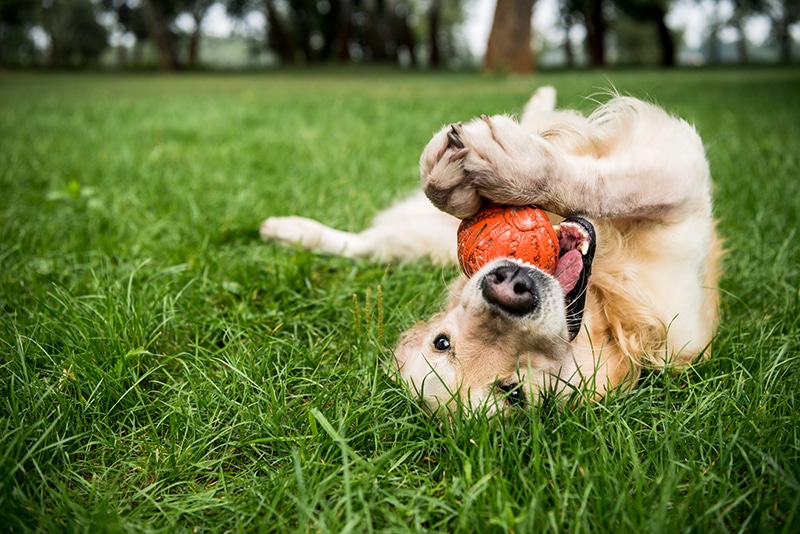Picking the best dog food for your Golden can be a challenging task. There are plenty of decisions to make. First, you need to consider fido’s life stage and health requirements. Next, you need to ensure that she gets all the proper nutrients from the highest quality sources. All of this with the abundance of information might be overwhelming.
I used my 12 years of Veterinary experience to review over 100 dog food products to find the best dog food for golden retrievers.
After considering the nutritional needs and genetic health conditions Goldens tend to have, I found that “Nutro Wholesome Essentials Large-Breed Adult Lamb & Rice Recipe” is the best overall food for adult goldens. In addition to meeting my dietary criteria for Goldens, it has the best combination of nutrients and quality sources.
But I understand that no two Goldens are alike, and your Golden might have a different life stage or have different needs. That’s why I prepared a shortlist of the best Golden foods that address the most common Golden needs.
In addition to picking the best products for your pooch, I outlined my process for choosing dog food. I want you to know what gets inside the furry stomach. The process is written in plain & simple English that will help you make wiser dietary decisions for your Golden.
I encourage you to read our review process and check out our in-depth reviews below so that you’ll be able to come up with your own dietary decisions.
Let’s get started.
Before You Pick The Best Food For Your Golden
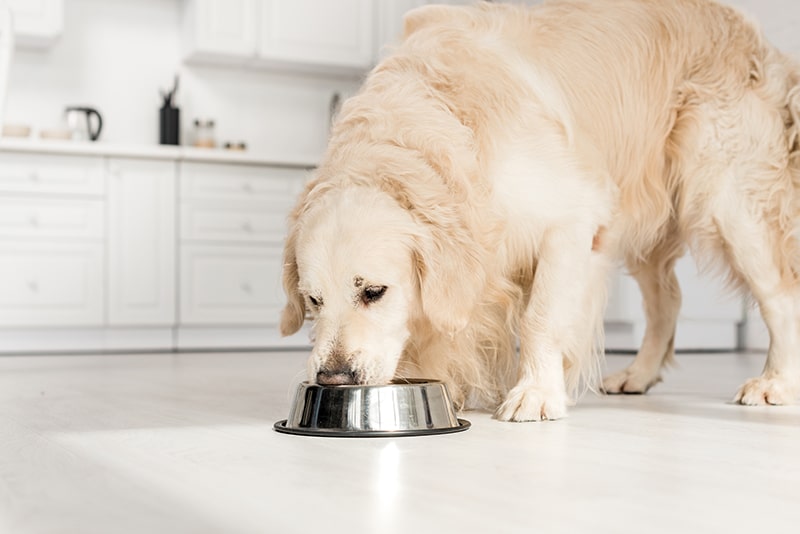
There’s no such thing as one food that fits all Goldens. While I did my best to find the best food for most Goldens, you might prefer to pick a more specific formula.
That’s why I elaborate here on my primary considerations while reviewing the best dog foods for Goldens.
You can divide your research journey into 3 steps:
- First, picking the right food for your Golden’s life stage – Puppies, Adults, and Senior goldens are in different development stages. Their joints, bones, and muscles develop at a different pace. That’s why you’ll need to pick the proper nutrients in the correct quantity for your Golden’s life stage.
- Picking the right food to reduce common Golden health issues – Each dog breed has an increased risk of catching certain health conditions. These health conditions are genetic, and Goldens are not indifferent. So make sure to pick the right ingredients to support common Golden health issues.
- Picking the suitable nutrient sources – Sometimes, two dog foods might seem similar. Both could provide the same nutritional value. However, it’s essential to question how the nutrients were sourced. We want to avoid chemicals and low-quality nutrients that can introduce some side effects.
The rest of the guide will show you how to pick the right food for your Golden’s life stage, how diet helps in common Golden health issues, and what to look for on the label.
For your convenience, I (Dr. Libby Guise) shortlisted 15 dog foods. These foods were carefully selected and should satisfy your Golden’s needs. I also noted which food is best for certain life stages or particular health issues.
After going through the shortlist, you can find additional considerations that might be of interest to you and your fur-baby.
Finally, I answered the most popular questions that I was asked regarding Goldens’ nutrition and diet.
Please keep in mind, while I did my best to find the best food for your Golden, it would be a good idea to understand how and why we made our decisions.
The recommendations in this review are not intended to replace the doctor-patient relationship. Always consult your veterinarian before making significant adjustments to your furbaby’s diet.
The Right Diet For Puppies, Adults, And Senior Goldens
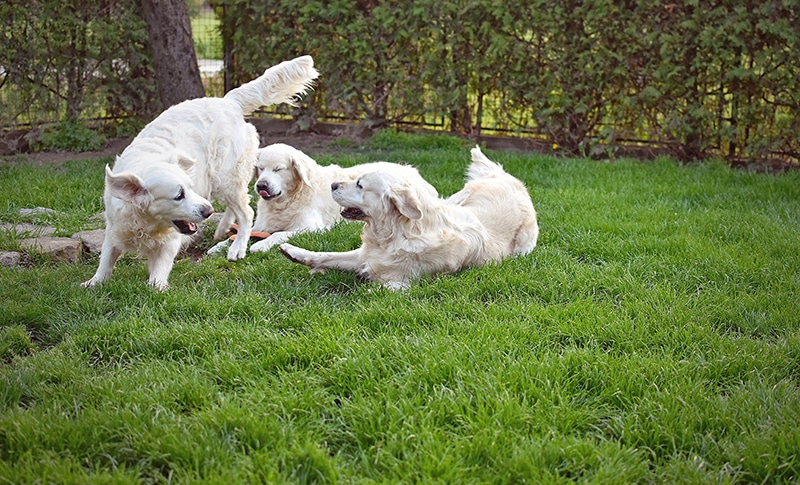
One of the most lovable breeds, the Golden Retriever is an intelligent, active pooch. However, at each life stage, Goldie will need to consume different nutrients and a different amount of calories.
Essential considerations for all life stages
At birth, the puppies usually weigh just over a pound. But, you don’t need to wait too long until these babies turn into large and loveable balls of fur. The average male reaches about 52 pounds by six months. That means they need a high-quality starter dog food that provides the energy and essential nutrients that they need for growth.
The Golden Retriever fares best on a kibble designed for large or giant breeds. These pups should have a high-protein diet (25-30%) to promote lean muscle mass. To supply adequate energy density, look for a 12-18% fat content. Remember that your golden will have some different nutritional requirements based on age, overall health, level of activity, and weight. We’ll look at age differences and give you some basic feeding guidelines below.
In addition to these nutrients, omega 3 and 6 fatty acids, glucosamine, and chondroitin help to ensure bone and joint health in canines that can be prone to hip dysplasia and arthritis later in life. Of course, your pooch will need a balanced blend of essential vitamins and minerals to support total body health. If your furbaby has heart health issues, you should also consider a formula that includes taurine.
Golden retrievers have voracious appetites and can be prone to overeating. So, you’ll need to monitor the diet closely to keep your furbaby from putting on unwanted pounds. In addition, obesity puts extra strain on the joints and heart that could exacerbate or cause health issues as your pooch ages.
Daily Calorie Requirements
The average number of calories your golden baby needs each day is:
- Puppies: approximately 1000 calories for a 6-month-old
- Adults
- Seniors: 900 calories
These general guidelines can help you find a starting point as you plan how much food your furbaby needs. Always consult with your veterinarian and check the product’s feeding recommendations to find the right balance for your pooch.
When Should You Change from Puppy to Adult to Senior Food?
- Puppies – When you bring your golden puppy home, use the same food as they offer their litters until your pup reaches 2 months. At this point, you may transition to a different kibble slowly over several weeks.
- At 2 months, golden puppies generally need about 1 ½ cups of high-quality food each day. Divide the kibble into 3-4 meals at first to provide a consistent energy source for your growing pooch.
- As your puppy grows, you will need to increase his portions as outlined on your dog food package. However, by the time he reaches six months, you should taper down to 2 daily meals.
- Adults – The best time to transition to adult food is between about 11 months and 1 year of age because the body is done growing. At this stage, your pup doesn’t need the energy density found in puppy food. You just need to make sure to provide quality protein from wholesome sources. However, if your golden is pregnant or nursing a litter, you should choose a specific diet.
- Seniors – Metabolic needs change as your furbaby gets older and becomes less active. Make the switch to senior dog food around 7 years of age.
Just remember, any time you make a dog food change, check with your veterinarian first. Then, make a slow transition to let your pup’s digestive system adjust to the different ingredients.
The Appropriate Nutrition For Common Golden Health Issues
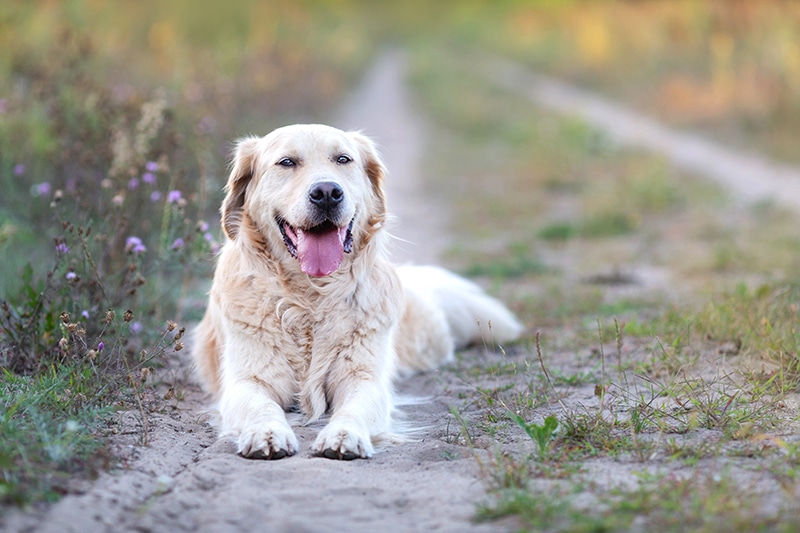
This active, large dog is usually energetic and fit, but the breed can show some distinctive health issues. As with many large breeds, these pups are at a higher risk of developing hip dysplasia and other joint problems. Goldens also suffer from allergies and food sensitivities, and some genetic heart defects and bleeding disorders. Let’s look at how diet may be able to help prevent or moderate these diseases.
Hip and Elbow Dysplasia
Golden Retrievers are one of several large breed dogs that have a predisposition to hip and elbow dysplasia. In these diseases, the joint capsules develop abnormally. As a result, the connecting bones don’t move smoothly. Which makes bone ends rub against one another, creating friction and damaging the joint.
Supplementing your pup’s diet with glucosamine and chondroitin may help prevent joint damage and inflammation. These naturally occurring nutrients help support the cartilage and synovial fluid in joints. Additionally, adding omega fatty acids can help rejuvenate healthy joints.
Osteochondrosis of the Shoulder or Elbow
Because they’re large breed dogs that grow fast as puppies, Golden Retrievers can be prone to Osteochondrosis. In this disease, the cartilage at the end of long bones fails to turn to bone at maturity. Instead, it makes Cartilage much softer than bone. As a result, cartilage flaps can form and separate from the bone. These free-floating fragments cause significant irritation and lameness.
Fortunately, diet can help. Look for a dog food that includes glucosamine to support joint and cartilage health. Clinical studies also suggest that overfeeding nutrients including protein, Vitamin D, Calcium, and Phosphorus can contribute to rapid bone growth and osteochondrosis. Consult with your veterinarian to ensure that your pup is getting the right balance of nutrients.
Obesity
Face it. We love to spoil our furbabies, and Golden Retrievers love to gobble their food. Unfortunately, this can be a dangerous combination. A 2012 study by the Association for Pet Obesity Prevention revealed that about 52.6% of dogs in the United States were obese. Golden Retrievers showed a higher incidence(62.7%).
Obesity adds stress on the joints, heart, and other vital organs. That’s why you need to keep your pal on a strict meal plan. Because these dogs are active and have voracious appetites, we recommend that you feed them twice a day. Keep treats to a minimum, and use healthy options. Choose a dog food that’s moderate-energy density and free of fillers.
Allergies
Goldens are vulnerable to several types of allergies, one of which is for food. When your pooch is sensitive to proteins in a particular food, it often leads to red, itchy skin and dandruff. Common allergens for Golden Retrievers include:
- Pork
- Beef
- Chicken
- Soy
- Eggs
- Dairy products
Feeding a limited ingredient and grain-free diet can often help reduce the risk of food allergies.
If you suspect your pooch has a food allergy, talk to your veterinarian. You may elect to try a food elimination diet to pinpoint the culprit so that you can avoid that particular ingredient.
Sensitive Stomach
If your pooch seems to have a sensitive stomach, schedule a check-up with your veterinarian. That way, you can rule out any serious issues. Some pups develop sensitivities to different food ingredients and have soft stools, diarrhea, regular vomiting, or flatulence. The cause can be hard to determine. However, you may be able to manage the symptoms by providing a quality diet that includes:
- Low to moderate fat
- High fiber from sources such as beet pulp or psyllium
- Wholesome meats – if you think your pup is reacting to the protein in his food, switch to a different meat ingredient
- Whole food ingredients
Hypothyroidism
In hypothyroidism, the thyroid glands in the neck fail to produce enough of the hormone, and Golden Retrievers are one of the more commonly affected breeds. Signs of hypothyroidism include thinning and dull hair coat, increased shedding, reduced activity, and cold intolerance. With canines, the disease is usually caused by inflammation or a shrinking of the gland itself. If you suspect your pooch may have this disease, you can talk to your veterinarian about running some blood tests.
If you have a dog that suffers from hypothyroidism, it’ll require some hormone replacement medications. However, you can help manage the condition with diet and supplements. Your dog’s food should be protein-rich and rely on whole meats such as fish or poultry. In addition, because lower thyroid can lead to weight gain, choose products that are lower in fat. Also, look for nutrients such as zinc, selenium, probiotic supplements, omega-3 fatty acids, and biotin. These ingredients help support healthy skin, coat, and gut function.
GMO or grain-free formulas that rely on whole foods will help provide the balanced nutrition that your pup needs. There are also some ingredients that you should avoid:
- Soy and soy foods
- Cruciferous vegetables such as broccoli, cauliflower, and kale
- Starchy plants such as sweet potato and cassava
- Nuts
- Beef by-products and processed meat products
- Strawberries, pears, and peaches
Von Willebrand’s Disease
Dogs with Von Willebrand’s Disease are born lacking a plasma protein named Von Willebrand factor. Without this protein, it takes longer for blood to clot. As a result, dogs with Von Willebrand’s disease may have frequent nose bleeds, easy bruising, bleeding gums, and a longer bleeding time when cut or injured.
There is no cure for Von Willebrand’s disease, but you can help support your pal through his diet. Vitamins K and C support the blood clotting mechanism, and other nutrients assist the body in producing new blood cells:
- Minerals – iron and copper
- Vitamins – Vitamin A and B vitamins (6, 12, and folate)
On the other hand, you should avoid vitamin E, garlic, and large doses of omega 3 fatty acids from fish oil as they interfere with Vitamin K absorption.
Portosystemic Shunts
Golden Retrievers are one breed that can be affected by a portosystemic shunt. Dogs are born with this condition, which involves an abnormal connection between the blood vessels associated with the liver and the body’s circulatory system. Typically, blood travels from the abdominal organs through the liver before entering the systemic bloodstream. That way, the liver can remove toxins and thus “purify” the blood for the rest of the body. However, when a shunt occurs, the blood bypasses the liver and subsequently carries toxins to the body.
Dogs with one or more portosystemic shunts may have:
- stunted growth
- seizures, blindness
- Aggression
- Inactivity
- a wobbly gait
- head pressing
and other symptoms.
Surgery can sometimes correct the problem but not always. However, it can also be treated medically and with a low-protein diet that won’t overtax the liver. In this case, milk and vegetable-based proteins may be more beneficial than meat.
Subaortic Stenosis
Another condition that Golden Retrievers may have from birth is Subaortic Stenosis. This problem involves a narrowing of the aorta near the heart just above the aortic valve. When stenosis is present, the ventricle can’t empty as it should, which affects the heart’s proper functioning.
Dogs with subaortic stenosis may faint, have difficulty breathing, or show muscle weakness. You can manage your pup’s condition by restricting exercise, providing medications, and feeding a low-sodium diet.
Taurine Deficiency
Studies suggest that Golden Retrievers are at risk of developing a taurine deficiency that may have a dietary component. Most dogs produce this amino acid on their own, so it’s not considered an essential nutrient. Pups that develop a deficiency can develop a heart disease known as Dilated Cardiomyopathy(DCM) or an enlarged heart.
In 2018, the FDA opened an investigation to determine if grain-free and legume-rich dog foods contribute to DCM. The results are inconclusive, but these formulas may not provide sufficient taurine to animals with a genetic predisposition for deficient production. In most cases, DCM linked to diet is treatable and may be reversed with heart medications, a change in diet, and supplementation with taurine.
Ensuring High-Quality Nutrients
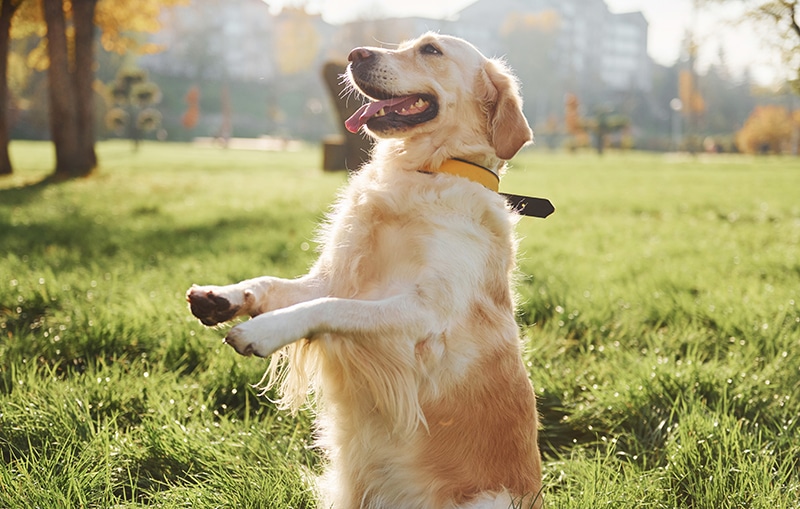
Now you understand the basic nutritional needs of Golden Retrievers. You also know how to adjust fido’s diet to present or potential health issues. It’s time to understand what makes high-quality dog food.
So, what ingredients do you want to see when you’re looking for the right food for your furbaby?
- Start With Whole Protein – Unless your pooch has a portosystemic shunt, you’ll want protein-rich food that comes from wholesome meats such as fish, chicken, or beef. In addition, you want a high-protein content to support lean muscle mass in this active breed.
- No By-products Please – Avoid ingredients that list meats such as chicken or beef followed by by-products. These are the parts of the animal considered unfit for humans to eat, such as lungs, tails, and feet.
- Valuable Supplements – There are some helpful supplements to look for in the ingredient list:
- Because Goldens are predisposed to joint disease, it’s wise to look for foods supplemented with glucosamine and chondroitin.
- A proper balance of calcium and phosphorus can also support healthy bone development.
- Probiotics and/or prebiotic fiber encourage proper digestion
- Free From Chemical Preservatives – You want the best for your pooch. Avoid substances such as Ethoxyquin, BHA, BHT, propylene glycol, or sodium nitrate/nitrite. Natural preservatives including tocopherols(Vitamins C and E), rosemary, and other herbs are healthier options.
- Meets AAFCO Nutritional Requirements – The American Association of Feed Control Officials(AAFCO) has established nutritional guidelines for science-based pet foods. Check the product’s label or website for a statement that the formula meets AAFCO requirements.
- Has Easily Digestible Ingredients – There’s no need to borrow trouble. Even if your Golden Retriever doesn’t show signs of a sensitive stomach, give him food that’s easy on the system. Fats and complex carbohydrates can be hard on digestion. Look for a shortlist of wholesome whole-food ingredients.
- Low to Moderate Fat Content – Once your pooch reaches the puppy stage, he won’t need as much energy. Keep the fat on the low to moderate side so that your pooch maintains a youthful build. You’ll also want to limit treats and extras.
- Focuses on Limited Ingredients – The saying Keep it Simple applies here. With limited ingredients, it’s easier to keep track of what your pup is eating. In addition, if your furbaby develops a food sensitivity or allergy, you and Fido’s doctor may have an easier time pinpointing the cause. And…limited ingredient diets tend to rely on wholesome whole-food sources that are nutrient-dense and readily digestible.
- Manufactured and Sourced in a Handful of Countries – You need to know that your dog’s food has quality, safe ingredients. Choose products manufactured in countries with good manufacturing practices and safe food standards, such as the United States, Canada, The UK, and New Zealand.
- Contains No Artificial Ingredients – Products that are free of artificial flavors, colors, or additives tend to be healthier for your pup. Look for formulas with natural, whole-food ingredients.
Our 2026 Review For 15 Dog Foods For Golden Retrievers

We reviewed over 100 products by following the process presented above and classified the best of them based on everyday Golden Needs.
We considered the life stage, common Golden health issues for each pick and ensured it has the best nutrient sources.
Nutro Wholesome Essentials Large-Breed Adult Lamb & Rice Recipe
- First 5 ingredients: Deboned lamb, chicken meal, brewers rice, whole brown rice, split peas
- Key feature: high protein, moderate fat
- Guaranteed Analysis: 20% Crude Protein, 12% Crude Fat,3.5% Crude Fiber, 10% Moisture
- Caloric Content: 318 kcal/cup
- Type of Product: Natural Dry Dog Food
- Life Stage: Large Breed Adult
- Best for: Overall Pick for Best Dog Food
- AAFCO Statement: formulated to meet the nutritional level established by AAFCO Dog food nutrient profile for maintenance
Nutro wholesome essentials feature deboned lamb as the first ingredient. The protein-rich kibble provides support for your dog’s lean muscle mass. With 12% crude fat, the energy content is appropriate to fuel an active golden retriever without adding extra pounds.
This food includes omega fatty acid supplements for healthy skin and coat. It also has ingredients to provide natural sources of glucosamine and chondroitin for joint health.
Whole grains and prebiotic fiber allow for easy digestibility in this kibble. The ingredients are free from corn, wheat, soy, or by-products for natural, clean food.
Owners report that their dogs love the flavor and have healthy skin and soft, shiny hair with this food.
American Journey Chicken & Sweet Potato Grain-Free Large Breed Puppy Recipe
- First 5 ingredients: deboned chicken, chicken meal, turkey meal, peas, chickpeas
- Key feature: High-protein, moderate fat
- Guaranteed Analysis: 36% Crude Protein,17% Crude Fat,5% Crude Fiber, 10% Moisture
- Caloric Content: 491 kcal/cup
- Type of Product: Grain-free dry dog food
- Life Stage: Puppy
- Best for: Puppies
- AAFCO Statement: formulated to meet the nutritional levels established by the AAFCO Dog Food Nutrient Profiles for growth and gestation/lactation
This formula from American Journey is packed with protein. Starting with a whole-muscle source as the first ingredient, it supports a growing pup to build healthy lean muscle mass. In addition, the fat content is high enough to provide energy for growth and activity.
With DHA, EPA, and a balanced blend of calcium and phosphorus, this puppy food offers essential nutrients for proper bone and brain development. In addition, it’s packed with nutrient-dense whole foods to provide your pooch with antioxidants and essential vitamins.
There are no artificial ingredients or grains in the product, so it provides clean nutrition with a low risk of developing allergic sensitivities in your young pup. In addition, prebiotic fiber from beet pulp and probiotics support healthy digestion.
Customers who bought this food share that their dogs like it, and it’s easy on digestion.
American Journey Large Breed Chicken and Sweet Potato
- First 5 ingredients: deboned chicken, chicken meal, turkey meal, peas, chickpeas
- Key feature: High-protein, moderate fat
- Guaranteed Analysis: 30% Crude Protein,12% Crude Fat,5% Crude Fiber, 10% Moisture
- Caloric Content: 370kcal/cup
- Type of Product: Grain-free dry dog food
- Life Stage: Adult
- Best for: Adults
- AAFCO Statement: formulated to meet the nutritional levels established by the AAFCO Dog Food Nutrient Profiles for maintenance
With three protein sources topping the ingredient list, this product provides a rich source of building blocks to support lean muscle mass in your golden. In addition, the fat content and energy density provide the fuel needed for an active adult.
The formula includes natural sources of glucosamine and chondroitin to keep your pal’s hips and joints healthy. In addition, fish meal, flaxseed, and salmon oil provide omega fatty acids to support the skin and hair.
Antioxidant and nutrient-rich whole foods such as blueberries, kelp, and carrots offer flavor and digestibility. This is a grain-free, all-natural product.
Some owners report that this food helps clear up loose stools and itchy skin from allergies, and their dogs love it.
Holistic Select Senior Health
- First 5 ingredients: chicken meal, chickpeas, peas, lentils, dried ground potatoes
- Key feature: High-protein, moderate fat
- Guaranteed Analysis: 28% Crude Protein,12% Crude Fat,5.5% Crude Fiber, 10% Moisture
- Caloric Content: 417 kcal/cup
- Type of Product: Grain-free dry dog food
- Life Stage: Senior
- Best for: Seniors
- AAFCO Statement: formulated to meet the nutritional levels established by the AAFCO Dog Food Nutrient Profiles for maintenance
This formula uses readily digestible ingredients and contains a protein-rich source from real chicken. In addition, the meal format provides a natural source of glucosamine and chondroitin to support your aging pup’s hips and other joints.
The formula includes nutrient-dense whole foods such as cranberries, apples, and blueberries. It’s free from artificial ingredients and animal by-products for maximum nutrition.
With omega fatty acids and taurine supplements, this food can help support cardiac health. In addition, it includes at least 100,000,000 CFU/lb of Lactic Acid microorganisms to aid digestion.
Most owners share that their dogs love to eat it, and it’s easy on the stomach.
Wellness CORE Grain-Free Original Deboned Turkey
- First 5 ingredients: deboned turkey, turkey meal, chicken meal, peas, dried ground potatoes
- Key feature: high protein, moderate fat
- Guaranteed Analysis: 34% Crude Protein,16% Crude Fat,4% Crude Fiber, 10% Moisture
- Caloric Content: 417 kcal/cup
- Type of Product: Grain-free, protein-rich dry dog food
- Life Stage: Adult
- Best for: Active Adults
- AAFCO Statement: formulated to meet the nutritional level established by AAFCO Dog food nutrient profile for maintenance
Packed with protein from the top three ingredients, this product provides support for lean muscle mass and repair in your active adult golden. The 16% fat content combined with the 34% protein content offers additional fuel to keep your pooch going all day long.
The grain-free kibble relies on digestible whole-food ingredients to supply a rich source of valuable nutrients. Foods such as spinach, apples, and blueberries provide antioxidants and essential vitamins to keep your pup in maximum health.
Gut health gets a boost from a minimum of 80,000,000 CFU/lb of Lactic Acid Microorganisms. The product has no artificial ingredients, fillers, by-products, or grains.
Customers who tried this food indicate their dogs love to eat it, and it helped clear up allergy symptoms in some dogs.
Blue Buffalo Wilderness Grain-Free Chicken
- First 5 ingredients: deboned chicken, chicken meal, peas, pea protein, tapioca starch
- Key feature: High protein, moderate fat
- Guaranteed Analysis: 34% Crude Protein, 15% Crude Fat, 6% Crude Fiber, 10% Moisture
- Caloric Content: 409 kcal/cup
- Type of Product: Grain-free
- Life Stage: Adult
- Best for: Grain-Free
- AAFCO Statement: formulated to meet the nutritional level established by AAFCO Dog food nutrient profile for maintenance
With a high protein content from whole muscle sources, this food helps build and support lean muscle mass. In addition, the moderate-fat (15%) provides energy to fuel your furbaby’s vibrant personality.
The grain-free diet includes whole foods for healthy carbs that are easy to digest. In addition, prebiotic fiber from chicory root and probiotics support gut health.
Natural sources of omega fatty acids and glucosamine nourish the skin, hair, and joints. There’s also a balanced blend of calcium and phosphorus for healthy bones.
Owners share that this food gives their dogs a healthy, shiny coat, and their pups love the flavor.
Taste of the Wild Salmon Dry Dog Food
- First 5 ingredients: salmon, ocean fish meal, sweet potatoes, potatoes, peas
- Key feature: Nutrient-rich, grain-free
- Guaranteed Analysis: 25% Crude Protein,15% Crude Fat,3% Crude Fiber, 10% Moisture
- Caloric Content: 360cal/cup
- Type of Product: Dry adult food
- Life Stage: Adult
- Best for: Skin Allergies
- AAFCO Statement: formulated to meet the nutritional needs established by the AAFCO Dog Food Nutrient Profiles for maintenance
With protein from whole foods, this product offers building blocks for strong, lean muscles. The salmon and fish meal is easily digestible. It provides a natural source of omega fatty acids for healthy hair and skin.
This formula includes natural, whole food sources that offer rich sources of vitamins and antioxidants for your pup’s health and immunity. It’s also supplemented with taurine to help ensure heart health.
Chicory root offers prebiotic fiber to complement the digestible carbohydrate sources from sweet potatoes and potatoes. The kibble also contains a minimum of 80,000,000 CFU/lb of probiotic microorganisms.
Owners share that this food is an excellent product for pups with food allergies. Dogs like the flavor, and the skin and coat look healthy again.
Diamond Naturals Adult Dry Dog Food – Large Breed
- First 5 ingredients: lamb meal, whole grain brown rice, cracked pearl barley, pea flour, rice bran
- Key feature: nutrient-rich, moderate fat and protein
- Guaranteed Analysis: 22% Crude Protein,12% Crude Fat,5% Crude Fiber, 10% Moisture
- Caloric Content: 320cal/cup
- Type of Product: Dry large breed adult food
- Life Stage: Adult
- Best for: Sensitive stomach
- AAFCO Statement: formulated to meet the nutritional needs established by the AAFCO Dog Food Nutrient Profiles for maintenance
With lamb as the primary ingredient, this product is made to be easy on the stomach. The formula includes whole foods that are easily digestible and packed with nutrients.
This food contains prebiotic fiber and not less than 80,000,000 CFU/lb Lactic Acid microorganisms to aid digestion. In addition, whole grains like brown rice and barley are gentle on the gastrointestinal system.
Supplements of omega fatty acids for healthy skin and coat, taurine for heart function, and glucosamine and chondroitin to support the joints provide whole-body nutrition.
Owners who fed this food to their dogs report that their furbabies have no digestive upsets.
Natural Balance L.I.D. Limited Ingredient Diets Grain-Free
- First 5 ingredients: salmon, menhaden fish meal, sweet potatoes, cassava flour, potatoes
- Key feature: limited-ingredient
- Guaranteed Analysis: 24% Crude Protein,10% Crude Fat,4% Crude Fiber, 10% Moisture
- Caloric Content: 373cal/cup
- Type of Product: Dry LID adult food
- Life Stage: Adult
- Best for: Allergies
- AAFCO Statement: formulated to meet the nutritional needs established by the AAFCO Dog Food Nutrient Profiles for maintenance
With salmon and fish meal as the first two ingredients in this dog food, this limited ingredient diet is low in allergens. The meat sources also provide a rich supply of omega fatty acids for healthy skin and coat.
There are no peas, legumes, lentils, corn, wheat, or soy in the formula, and it’s free of artificial ingredients.
This kibble uses potatoes and cassava as digestible sources of carbohydrates. It has a moderate level of fat to meet your pooch’s needs. With a balanced blend of vitamins and minerals to supplement the formula, this product supports whole-body health.
Dog owners report that feeding this product to their pets helps resolve red itchy skin and hot spots.
Eagle Pack Adult Large and Giant Breed Dog Food
- First 5 ingredients: chicken meal, pork meal, ground brown rice, oatmeal, rice
- Key feature: high protein, moderate fat for an active lifestyle
- Guaranteed Analysis: 25% Crude Protein,12% Crude Fat,4% Crude Fiber, 10% Moisture
- Caloric Content: 340 kcal/cup
- Type of Product: Large and giant breed dry dog food
- Life Stage: Adult
- Best for: Joint Health
- AAFCO Statement: formulated to meet the nutritional needs established by the AAFCO Dog Food Nutrient Profiles for Maintenance
With sources of glucosamine, chondroitin, calcium, phosphorus, and vitamin D3, this food contains essential nutrients to support healthy joints and bones. In addition, the first two ingredients come from wholesome protein sources to support lean muscle mass.
It also has a low/moderate fat content to help your pooch stay lean and trim and minimize stress on the body. The carbohydrates come from digestible whole grains to fuel your pooch’s active lifestyle. In addition, there is a minimum of 70,000,000 CFU/lb of Lactic acid microorganisms to enhance digestive health.
Owners who feed this food say their dogs love the flavor and thrive on the formula.
Halo Holistic Chicken Recipe Large Breed Dry Food
- First 5 ingredients: chicken, chicken liver, dried egg product, oatmeal, pearled barley
- Key feature: high protein, moderate fat for an active lifestyle
- Guaranteed Analysis: 25% Crude Protein,15% Crude Fat,5% Crude Fiber, 10% Moisture
- Caloric Content: 403 kcal/cup
- Type of Product: Holistic Adult Dry Dog Food
- Life Stage: Adult
- Best for: Heart Health
- AAFCO Statement: formulated to meet the nutritional needs established by the AAFCO Dog Food Nutrient Profiles for Maintenance
With real, whole proteins, taurine, and no added salt, this product offers nutritional support for a healthy heart. The moderate fat content provides energy for the activity level of a golden retriever.
Whole foods such as cranberries, blueberries, and carrots in the ingredients mean this kibble is nutrient-dense and packed with antioxidants. There are no artificial additives.
A balanced blend of essential vitamins and minerals and natural sources of omega fatty acids supports your pup’s whole-body health. The supplementation with taurine helps to support a healthy heart and may help to prevent or treat DCM in golden retrievers.
Nature’s Variety Instinct Raw Boost Healthy Weight Grain-Free Chicken Recipe
- First 5 ingredients: chicken, chicken meal, peas, tapioca, menhaden fish meal
- Key feature: high protein, low fat
- Guaranteed Analysis: 32% Crude Protein,11% Crude Fat,7.5% Crude Fiber, 9% Moisture
- Caloric Content: 368 kcal/cup
- Type of Product: Grain-Free Dry Dog Food
- Life Stage: Adult
- Best for: Weight loss
- AAFCO Statement: formulated to meet the nutritional needs established by the AAFCO Dog Food Nutrient Profiles for Maintenance
This food starts with freeze-dried raw chicken as the primary ingredient to provide an easily digestible and rich protein source. In addition, the raw food helps to keep the fat content low for your pooch so that Fido won’t add unwanted pounds.
The formula supports healthy weight loss with dense fiber content and L-carnitine to help your pup’s metabolism burn fat. In addition, natural sources of omega fatty acids help to ensure healthy skin and soft, shiny hair.
A minimum count of 60,000,000 CFU/lb of Bacillus coagulans enhances healthy digestion.
Owners reported that this food helped their dogs reach and maintain a healthy weight.
Merrick Backcountry Raw Infused Large-Breed Recipe Dry Food
- First 5 ingredients: deboned chicken, chicken meal, turkey meal, sweet potatoes, potatoes
- Key feature: high protein, moderate fat
- Guaranteed Analysis: 38% Crude Protein,17% Crude Fat,3.5% Crude Fiber, 9% Moisture
- Caloric Content: 368 kcal/cup
- Type of Product: Grain-Free Raw-Infused Dry Dog Food
- Life Stage: Adult
- Best for: High Protein
- AAFCO Statement: formulated to meet the nutritional needs established by the AAFCO Dog Food Nutrient Profiles for Maintenance
Packed with 38% protein, the top 3 ingredients in this food come from natural meat sources. Combined with the moderate fat content, Merrick Back Country is made to supply your active golden with the fuel he needs.
Digestible carbohydrates and whole foods, including blueberries and apples combined with probiotics that support gut health. The ingredients provide a balanced blend of essential nutrients for health.
Owners report their dogs to thrive when eating this food.
Taste of the Wild Southwest Canyon
- First 5 ingredients: beef, peas, garbanzo beans, lamb meal, canola oil
- Key feature: high protein, moderate fat
- Guaranteed Analysis: 29% Crude Protein,15% Crude Fat, 5% Crude Fiber, 10% Moisture
- Caloric Content: 360 kcal/cup
- Type of Product: Grain-Free Dry Dog Food
- Life Stage: Adult
- Best for: Picky Eater
- AAFCO Statement: formulated to meet the nutritional needs established by the AAFCO Dog Food Nutrient Profiles for Maintenance
With the tasty appeal of beef, lamb, and wild boar, this adult food from Taste of the Wild should satisfy the picky eater. Whole muscle protein sources provide the building blocks for lean muscle mass.
Because golden retrievers are active pups, this food has a 15% fat content to provide sufficient energy. The formula also has whole-food goodness that offers essential nutrients, omega fatty acids, and antioxidants for immunity and overall health.
In addition to digestible ingredients, the food includes prebiotic fiber from chicory root and a proprietary blend of probiotics.
Owners report that their pups gobble this food and maintain a healthy appearance and weight.
Solid Gold Love at First Bark – Wet
- First 5 ingredients: lamb, water, lamb liver, ocean whitefish, brown rice
- Key feature: Holistic ground food
- Guaranteed Analysis: 8.5% Crude Protein,8.5% Crude Fat, 1.5% Crude Fiber, 78% Moisture
- Caloric Content: 552 kcal/cup
- Type of Product: Wet Food
- Life Stage: Adult
- Best for: Wet
- AAFCO Statement: formulated to meet the nutritional needs established by the AAFCO Dog Food Nutrient Profiles for Maintenance
With lamb as the first ingredient, this food offers nutrient-rich protein sources to support your dog’s lean muscle mass. The ocean whitefish supply a natural source of omega fatty acids for healthy skin and coat.
This food is easy to digest since it contains wholesome whole grains and probiotics, this food is easy to digest. Use it as the main course or a topper on your pal’s kibble.
Owners share that their dogs love the flavor and that it helps picky eaters gobble their dry food.
What About Taurine Deficiency?
Studies suggest that Golden Retrievers are at risk to develop a taurine deficiency that may have a dietary component. Most dogs produce this amino acid on their own, so it’s not considered an essential nutrient. Pups that develop a deficiency can develop a heart disease known as Dilated Cardiomyopathy (DCM) or an enlarged heart.
In 2018, the FDA opened an investigation to determine if grain-free and legume-rich dog foods contribute to DCM. The results are inconclusive, but these formulas may not provide sufficient taurine to animals with a genetic predisposition for deficient production. In most cases, DCM linked to diet is treatable and may be reversed with heart medications, a change in diet, and supplementation with taurine.
Are Grain-Free Diets Safe for Golden Retrievers?
Although the FDA warned about a loose association between grain-free diets and DCM, the relationship is not that simple. As a matter of fact, in a follow-up report, the FDA shared that their studies show the disease is multifactorial.
According to Lisa M. Freeman, DVM, Ph.D., DACVN from Tufts University, Cummings Veterinary Medical Center, in many cases, DCM is not associated with grain-free diets, and it may or may not have to do with the ingredients used to replace grains. She identifies “BEG” (boutique, exotic ingredients, or grain-free) diets as the possible culprits but stresses that there may also be other factors involved. Because these diets may be linked to a life-threatening condition, you may want to play it safe and choose a different dog food or look for a brand that includes taurine in the formula.
When it comes to golden retrievers, there may be more that you can do to help prevent DCM. Dr. Josh Stern, a veterinary cardiologist at UC Davis evaluated goldens with DCM and taurine deficiency to determine whether supplementation with the amino acid would be helpful. His results suggest that the breed responds favorably to supplementation with taurine.
If you choose to give your pooch a grain-free diet, remember to monitor him for signs such as exercise intolerance, lethargy, coughing, and weakness. Consult with your veterinarian if you’re concerned that your pooch may develop or have DCM. He or she can examine your pup, measure his taurine levels, and prescribe any necessary medications.
Frequently Asked Questions
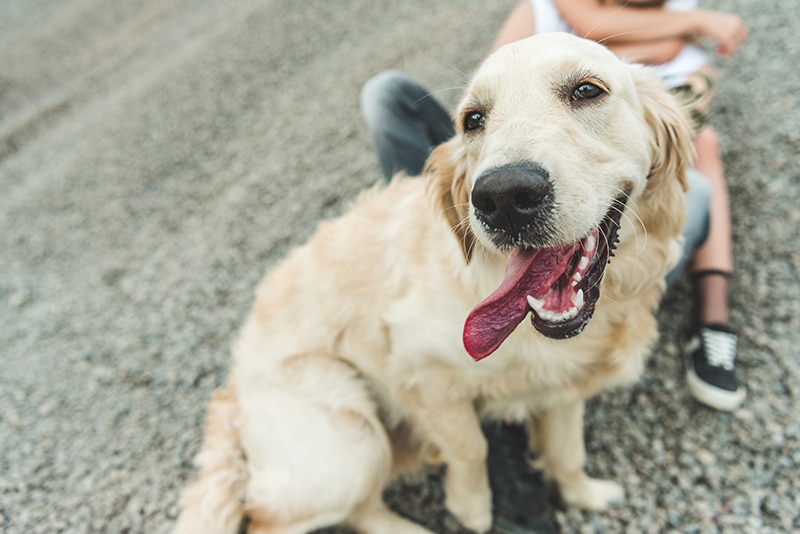
How do I know if my Golden Retriever is overweight?
To tell if your pup is the right weight, touch the area over his ribs. You should be able to feel the bones through a thin layer of fat.
Another way to determine whether fido is overweight is to look at your dog from above to see if the barrel visibly tapers at the waist.
How often and how much should I feed my golden?
The package should have general feeding guidelines based on your pup’s weight. This gives you a starting point.
If you need to be more precise with the food quantity:
- Take the calories per serving/cup listed on the label
- Divided by the number of calories your pooch needs in a day(listed above).
Since goldens are high-energy dogs, we recommend dividing the portion into morning and evening meals. That way, your pooch has a more consistent energy supply throughout the day.
How can I switch to a new dog food without making my dog sick?
Dogs may suffer digestive upset if you switch their food abruptly. We recommend making a gradual shift over 1-2 weeks. Start by mixing small amounts of the new kibble with the old food and slowly increase the ratio of new to old.
Do golden retrievers need unique dog food?
Healthy Golden Retrievers do not need a unique or boutique brand of food. Instead, focus on the nutritional content following the feeding guidelines that we shared above. If your pooch suffers from a health issue, then you may need to adjust the diet to accommodate his needs.
When is a golden retriever considered a senior?
As a large breed dog, the average life expectancy is 10-12 years, and they are considered to hit their senior years around 7 years of age.
When should I change my golden’s food?
There are several stages where you should transition from one food to another:
- When you first bring your golden puppy home, keep him on the food the breeder has been feeding until he’s at least 8 weeks. That way, Fido will have a chance to adjust to a new home before going through a diet change.
- Transition your golden from puppy to adult food between about 11 and 12 months. When your pooch is a year old, the body frame is done growing, so your furbaby won’t need the same nutrient density.
- Switching to senior food should occur around 7 years when your furry pal’s metabolism and activity level begins to slow down.
- If you discover that your pooch has a health condition, you may also need to make a diet change.
Remember to follow the guidelines above about switching food any time you transition diets.
Can golden retrievers be vegetarian?
We don’t recommend it. If you follow a vegetarian or vegan lifestyle, that doesn’t mean that your pooch should have the same diet. Before domestication, dog ancestors were meat-eaters and relied on animal proteins. Today’s canines still require essential amino acids that come from animal sources. However, you can provide about 20% vegetarian food in the diet.
Does my golden retriever need supplements?
The answer to this question depends on your dog’s food choices. Glucosamine and chondroitin supplementation is wise because golden retrievers are prone to hip dysplasia and other joint diseases. However, a nutritionally balanced diet will usually provide the other nutrients that your furbaby needs.
What is the healthiest food for golden retrievers?
The healthiest food is one that provides the best nutritional balance for your pal’s needs. Look for high protein, low to moderate fat, and a balanced blend of essential vitamins and minerals.
Why is my golden retriever always hungry?
Goldens have a voracious appetite because they are high-activity dogs and tend to burn lots of energy. But don’t let that mislead you. You still need to hold them to a strict diet to avoid obesity.
Why does my golden retriever eat so fast?
Your pooch may wolf down his food simply because he loves the taste and is excited about mealtime. Unfortunately, some dogs also develop competitive eating behavior when they’re puppies. They learn to eat fast to prevent their littermates from stealing their dinner, which can carry over into adulthood.
What should I do if my golden retriever is a picky eater?
If you have a healthy golden retriever, don’t panic. Dogs can go without several meals. Avoid the temptation to give your pup table scraps, as that will make it harder to get Fido to eat his food. Before you make a complete switch to different food, try this:
Feed your pooch and leave the meal out for about 30 minutes. Remove any uneaten food and put it away until the next mealtime. If you’re feeding dry kibble, you can set the same food out again. However, if you’re feeding canned, you should use a fresh portion. When your pal gets hungry enough, he’ll probably eat what you serve.
One note: some dogs have texture preferences. If you have a pup who prefers moist or semi-moist over dry, stick with that type of food.
Wet Versus Dry Dog Food – Which Type Should You Feed Your Golden?
There are benefits and drawbacks to both types of food. They can both offer balanced nutrition, but they have different features.
Wet food is often more appealing to dogs, even if you have a picky eater. It’s also easier to digest for pups with a sensitive stomach. In addition, the moisture content of wet food can help keep your pooch well hydrated. However, especially for large breed dogs that consume more, it may not be cost-effective.
Dry food offers more texture and crunch for your furbaby to enjoy. It can help to scrape plaque and tartar from the teeth. As a less perishable food, kibble does not require refrigeration, and it lasts longer. Finally, dry food is easier on the wallet.
The Final Woof

After reviewing over 100 products on the market and comparing them to our criteria for golden retrievers, we recommend Nutro Wholesome Essentials Large-Breed Adult Lamb & Rice Recipe as the best dog food for golden retrievers.
This kibble features a moderate/high protein content from two meat sources and moderate fat content. The combination provides support for an active pooch like a golden retriever.
In addition, there are omega fatty acids for healthy skin and coat and natural sources of glucosamine and chondroitin for joint health.
The formula includes digestible whole grains and prebiotic fiber that supports gut health.
Nutro Wholesome Essentials provides the nutrients a Golden Retriever needs for a healthy lifestyle.

